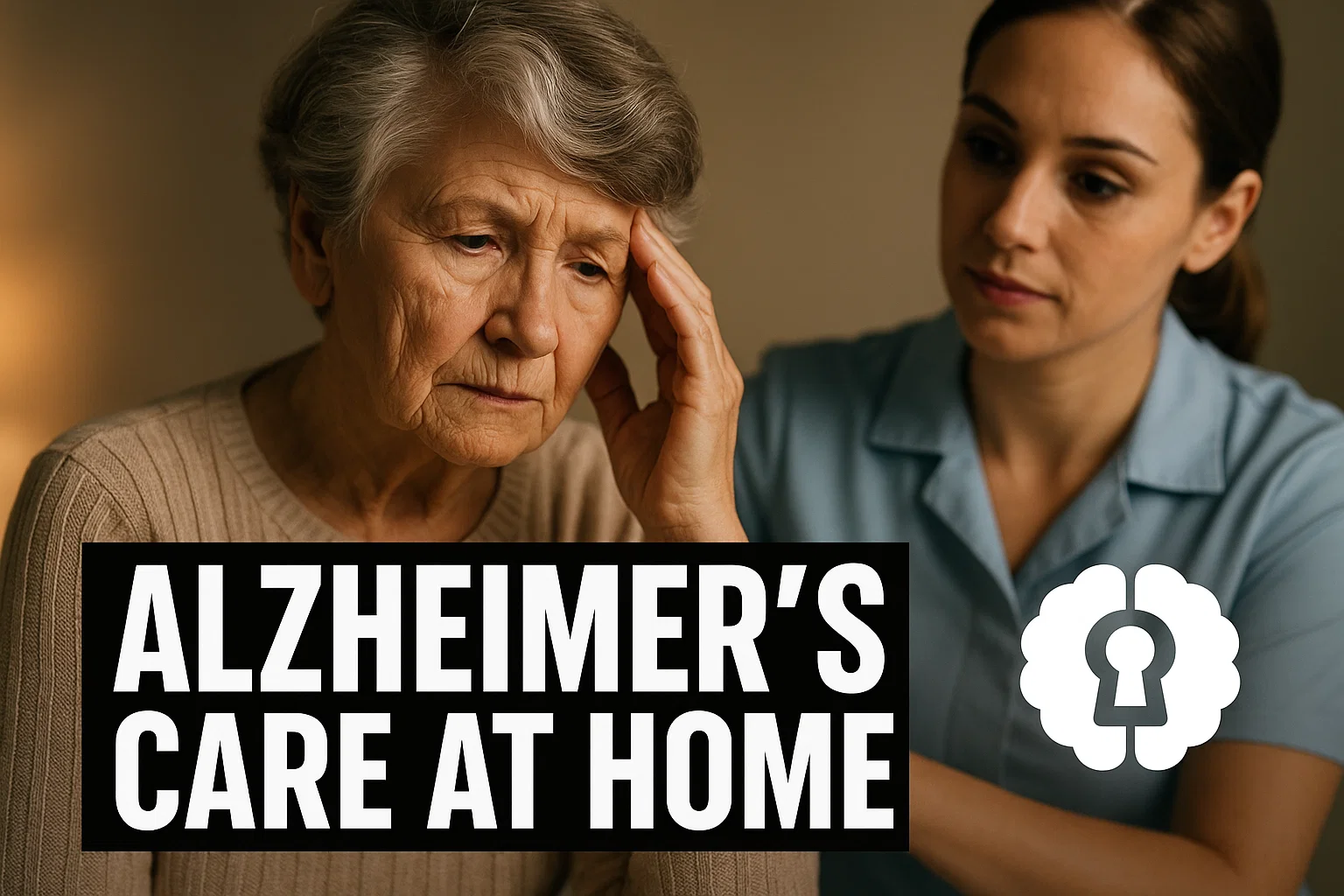It is a rewarding task to take care of a loved one with Alzheimer. The life of caring and taking care of their loved ones is something families yearn to give their best, yet the tasks and the emotional burden of it can be tiresome. It is a normal experience to experience stress, anxiety or even burnout when one is alone trying to cope with it all.
That is where the home-based care of Alzheimer or care can really help. Families can feel better knowing that their loved one is safe, comfortable and enjoying a personalized attention that they need with professional support. Simultaneously, families become peaceful and have an opportunity to spend good time together rather than be under constant tension.
Why Alzheimer’s Care at Home Matters
Alzheimer is not only loss of memory. It usually influences behavior, communication and an individual capacity to cope with everyday activity. Family members could be unable to reconcile between care and employment as well as kids and other obligations. That is why caregiver support services in Alzheimer are required so much, as they bring some order, counseling, and relief to families that need to be assisted in handling the struggles of the illness.
Professional caregivers are trained to deal with special needs such as wandering, sundowning and sudden mood change. They do not just offer physical support; they also offer emotional support to the seniors to make them feel respected and understood. This kind of assistance assists families to prevent caregivers burnout and provides their loved ones with high-quality and compassionate care.
What Alzheimer’s Care at Home Provides
Home based care of Alzheimer patients is made in such a way that the seniors care feel at home where they feel most at home. This is a comfortable environment, which lowers confusion, anxiety and stress among the patient, as well as providing the families with a feeling of security. Services are versatile and can be changed according to the course of the disease.
The most widespread of these services are:
- CADLs that include bathing, dressing, and grooming.
- Drug alerts to make sure the elderly remain abreast with their healthcare services requirements.
- Preparation of meals that goes in line with the diet and health needs.
- The fall, wandering, or accident risk reduction through safety monitoring.
- Friendship and chatting to facilitate emotional health.
- Caregivers of Alzheimer victims can rest and renew their energies through respite care.
Home care is an effective solution considering it needs to be personalized to individual needs which serves as an effective way of supporting the patient besides reducing the burden on the family.
How Alzheimer’s Care at Home Eases Family Stress

Being a caregiver to a patient with Alzheimer may call on 24-hour care. Families can also experience difficulty in worrying round-the-clock, having insomnia, and the dilemma of integrating caregiving with other life aspects. This stress may eventually affect their health and relations. Home-based care to Alzheimer is implemented as an emergency measure and reprieve.
1. Reduces Emotional Strain on Families
It is emotionally difficult to see a loved one transform as a result of Alzheimer. When families are unable to tackle all tasks themselves, they may experience sadness, frustration or guilt. Through the help of privately hired caregivers of Alzheimer disease, families are able to experience the existence of caring professionals, who learn how to care about patients and their loved ones. This emotional support enables the families to grapple with the difficulties in a more health-promoting manner.
2. Provides Reliable Daily Structure
Routines are also the favorite of Alzheimer patients. The confusion and agitation is minimized by having a predictable schedule of meals, medications, and activities. These routines are upheld regularly by professional care givers and this makes the seniors comfortable and the family members feel that nothing goes unnoticed.
3. Improves Safety at Home
One of the largest issues of families is safety. Being lost, not remembering to switch off gadgets, or tripping can cause undying anxiety. Home-based care is part of the process of providing care to the ill with Alzheimer and involves monitoring of the environment and making modifications to the environment to reduce risks. Even when they are not physically available, families have a sense of peace knowing that their loved one is secure.
4. Allows Families to Rest and Recharge
Caregiver burnout is common. Caregiving 24 hours a day may cause physical and mental burnout to the family members. Respite care to Alzheimer caregivers provide much required breaks that could be on a few hours or days. The time enables the families to concentrate on their health, career, or lives without the feeling of guilt.
5. Encourages Meaningful Family Time
By getting the burden of care-giving off, the family will be able to spend more quality time with their loved one. They do not have to worry about medicine or meals but can take time reminiscing, hobbies or even enjoy being together. This change makes bonds stronger and enhances emotions of all people.
6. Offers Professional Expertise
The specialized caregivers are taught techniques that can make a tangible difference like behavioral assistance concerning dementia and tailor-made plans to Alzheimer disorder. As an illustration, they can play music to help them relax when they are anxious or refocus their minds when they are confused. This professional knowledge is beneficial to the families since they might not have it on their own.
7. Builds Long-Term Support Systems
A care agency that focuses on the treatment of Alzheimer patients offers continuity of care, which implies that elderly individuals and families can expect the services of a trustworthy partner as the disease advances. This continuous association brings trust and stability eliminating any uncertainty and gives families hope in the future.
All of these advantages demonstrate that home care has more than just practical value in Alzheimer treatment it is a lifeline to both the elderly and their relatives.
Benefits of Alzheimer’s Care at Home
Those who opt to provide care to their families at home soon discover the difference. The main benefits of the Alzheimer care are:
- Comfort of home – Seniors feel much more comfortable in an environment with people they know well, routines and personal things.
- Personalized attention – Care plans are developed according to personal habits, needs and preferences.
- Better health management – There is close monitoring of medication, nutrition and exercise.
- Reduced stress for families – Family members will feel comfortable knowing that their loved one is okay and taken care of.
- Emotional reassurance – Routine activities and company decrease the anxiety and frustration.
- Maintained independence – Elderly are made to engage in their day to day living with the appropriate required support.
Tips for Families Using Alzheimer’s Care at Home
Families may use some few strategies to maximize the benefits of home care services:
- Openly discuss routines, habits and preferences with caregivers.
- Provide a secure environment at home; this includes eliminating trip hazards, labeling objects and locking doors as necessary.
- Keep engaged through regular check-in, and being a part of the care planning.
- Contact respite care when necessary in order to balance and avoid burnout.
- Do things that make you happy e.g. listening to music, gardening or viewing family photographs.
Home based care of Alzheimer is even more effective by using both professional support and family involvement.
FAQs
It involves specialized care that is rendered in the home of the senior to enhance their daily needs, safety and emotional comfort.
It is a relief, it is restorative to care-givers and seniors receive regular and quality care.
Home care is preferred by many families as the elderly remains in a setting that is very familiar and comforting which in most cases alleviates confusion and anxiety.
Admittedly, individual Alzheimer care plans are created to suit each elder in terms of routines, health requirements and style of living.
The services provided by the Alzheimer care agency are flexible and adjust with the progress of the disease making sure that it is supported throughout the stages.
Yes, families can even provide respite care to the Alzheimer caregivers to have a break and also have the loved one taken care of.
Search agencies specialized in Alzheimer, offer their staff training, and deal with families to develop individual care plans.
Conclusion
Home-based Alzheimer care is not merely a mere service but it is a comforting, stabilizing, and relieving factor to both the elderly and their families. It enables the loved ones to grow old with dignity and reduces the burden that family members have to endure because of them aging. Families are also able to be able to concentrate on creating memories and spending quality moments together rather than be overwhelmed by the continuous caregiving needs with the appropriate support.
Visit Precious Pearl Home Care to know more about how the home care can help your family.






